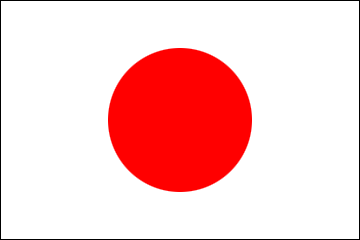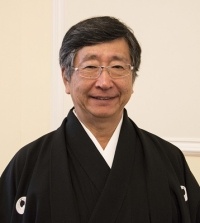Ambassador's Blog
2019/5/17
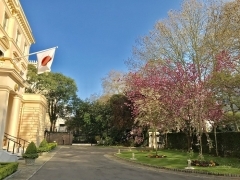 Cherry blossom at the residence
Cherry blossom at the residence
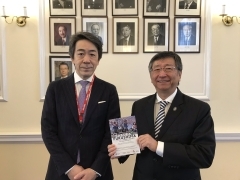 With Mr Hitoshi Suzuki, NHK Fukushima
With Mr Hitoshi Suzuki, NHK Fukushima
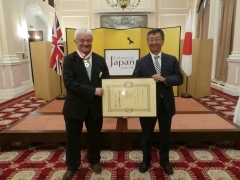 With Sir Paul Nurse
With Sir Paul Nurse
The new era "REIWA"
Japan has recently been the focus of the world’s attention as His Majesty the Emperor Emeritus stepped down, being succeeded by His Majesty the Emperor Naruhito. On Monday 1 April, the Government of Japan announced the name of the new era beginning on 1 May as “Reiwa”. The name “Reiwa” comes from a passage from the Manyoshu, Japan’s oldest anthology of poetry, compiled more than 1,200 years ago. It is formed from two kanji characters used in the passage. From the context, “rei” means “beautiful” and “wa” means “harmony”. Thus the name adopted for the new era is intended to conjure up the idea of culture developing and flourishing when people bring their hearts and minds together in a congenial manner.
Diplomatic life has proceeded as normal despite the momentous change of era in Japan. In fact, here in London April was a little less hectic than usual. I did not complain, though, as I consequently had plenty of time to enjoy the sakura (cherry blossom) at my residence! (For proof, see my Twitter post of 1 April!)
Cherry blossom is also at the heart of an initiative in which the Embassy is involved – the Sakura Cherry Tree Planting Project. This originated from a proposal by the Japanese private sector to donate a substantial number of cherry trees to the UK as a symbol of our friendship. The scheme’s “Sakura Team” has identified potential sites across the UK, and the trees will be planted towards the end of next year.
Meanwhile, sakura was a feature of a photography exhibition at the Embassy, Sakura in Fukushima, co-organised with NHK Fukushima, whose director Mr Hitoshi Suzuki visited me at the Embassy on 1 April. That evening I enjoyed a delightful concert by the Fukushima Youth Sinfonietta at the Southbank Centre. The audience was captivated by their performance, which included Tchaikovsky’s Fifth Symphony.
Towards the end of April I took part in another event worthy of mention. On the 25th the emphasis was on science as I had the pleasure of hosting a ceremony and reception at the Embassy, where I conferred upon Sir Paul Nurse the Order of the Rising Sun, Gold and Silver Star in recognition of his outstanding contribution to scientific and academic relations between Japan and the United Kingdom.
On top of his influential work in the field of genetics and cell biology, Sir Paul has done a great deal to promote Japan-UK collaboration in the arena of science. In this connection he has been to Japan many times and welcomed Japanese researchers to the UK. Among his many activities, as a Council Member of the Science and Technology in Society (STS) Forum he has visited Japan to attend and speak at the Forum as a representative of UK academia. Moreover, through his involvement in the Hideyo Noguchi Africa Prize Committee, he has helped widen the reach of Japan’s efforts in the field of infectious diseases to the international community. In view of these and his many other achievements, he fully deserves the decoration from the Government of Japan.
Although April was not the busiest of months for the Embassy, there will be plenty of significant events in the weeks and months ahead. Thus we will have numerous opportunities to remind ourselves of the excellent relations our two countries have come to enjoy, and of the importance of making them stronger still.
Koji Tsuruoka
Ambassador
Diplomatic life has proceeded as normal despite the momentous change of era in Japan. In fact, here in London April was a little less hectic than usual. I did not complain, though, as I consequently had plenty of time to enjoy the sakura (cherry blossom) at my residence! (For proof, see my Twitter post of 1 April!)
Cherry blossom is also at the heart of an initiative in which the Embassy is involved – the Sakura Cherry Tree Planting Project. This originated from a proposal by the Japanese private sector to donate a substantial number of cherry trees to the UK as a symbol of our friendship. The scheme’s “Sakura Team” has identified potential sites across the UK, and the trees will be planted towards the end of next year.
Meanwhile, sakura was a feature of a photography exhibition at the Embassy, Sakura in Fukushima, co-organised with NHK Fukushima, whose director Mr Hitoshi Suzuki visited me at the Embassy on 1 April. That evening I enjoyed a delightful concert by the Fukushima Youth Sinfonietta at the Southbank Centre. The audience was captivated by their performance, which included Tchaikovsky’s Fifth Symphony.
Towards the end of April I took part in another event worthy of mention. On the 25th the emphasis was on science as I had the pleasure of hosting a ceremony and reception at the Embassy, where I conferred upon Sir Paul Nurse the Order of the Rising Sun, Gold and Silver Star in recognition of his outstanding contribution to scientific and academic relations between Japan and the United Kingdom.
On top of his influential work in the field of genetics and cell biology, Sir Paul has done a great deal to promote Japan-UK collaboration in the arena of science. In this connection he has been to Japan many times and welcomed Japanese researchers to the UK. Among his many activities, as a Council Member of the Science and Technology in Society (STS) Forum he has visited Japan to attend and speak at the Forum as a representative of UK academia. Moreover, through his involvement in the Hideyo Noguchi Africa Prize Committee, he has helped widen the reach of Japan’s efforts in the field of infectious diseases to the international community. In view of these and his many other achievements, he fully deserves the decoration from the Government of Japan.
Although April was not the busiest of months for the Embassy, there will be plenty of significant events in the weeks and months ahead. Thus we will have numerous opportunities to remind ourselves of the excellent relations our two countries have come to enjoy, and of the importance of making them stronger still.
Koji Tsuruoka
Ambassador
